Fritz Lang's
Lost
Metropolis -
Rediscovered!
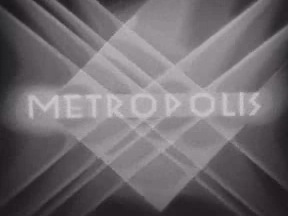
Film miracles never cease, and the heavens opened wide over Berlin last week for a special announcement of a major film rediscovery. Thought long lost since 1927 -- a full eighty years ago -- an almost completely intact 16mm print of the original full-length premiere version of Fritz Lang's Metropolis has surfaced. Heavily promoted by the German magazine DIE ZEIT (which immediately released a celebratory issue) the recovery of this lost classic is making big waves among film fans everywhere. After all the hoaxes we've suffered about recovered uncut prints of Greed and The Magnificent Ambersons, this is the real thing, confirmed by experts in Germany and backed by still frames and brief clips already viewable online.
The footage is of poor quality and heavily scratched, but is said to be intact -- perhaps as much as 25 or 30 minutes longer than the latest restoration. For cinema fans, and especially science fiction fans, this discovery is akin to recovering lost books of The Bible.
Just seven years ago we were treated to a near-miraculous restoration of the pieces of Metropolis that had survived. German archivists reassembled the best version they could from bits found in archives all over the world. That effort resulted in a film 147 minutes long, at the archivists' approved projection speed of 20 fps, or 123 minutes at the official premiere projection speed. The restoration was so precise that the film substituted text cards to explain missing sections of the story. Viewers could appreciate the enlarged scope of the picture while trying to imagine the content of the still-missing footage.
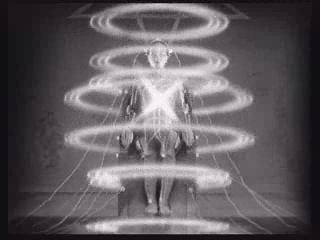
I think my reaction is typical of most film fans. We were always puzzled by the abridged eighty-minute version that superceded the full-length original after only a few weeks, even in Berlin. Until 2001, the Metropolis we could see was an indistinct 16mm dupe of this cut, with poor contrast and many unsteady scenes. American distributor Paramount streamlined the story to such a degree that the reasons why scientist-alchemist Rotwang (Rudolf Klein-Rogge) made the "Robot Maria" for "Masterman", the leader of Metropolis (Alfred Abel), were completely unclear. Giorgio Moroder's 1984 disco-revision added a few new scenes and some still-photo replacements for a couple of others, but not until the major 2001 restoration did we learn the full arc of the plot. In the cut-down American version, the later actions of the "real" Maria (Brigitte Helm) make little sense. Masterman was originally named Joh Fredersen and the Robot Maria's real name is The Maschine Mann.
I've been corresponding with the truly committed Metropolis-philes for about ten years now, most frequently with Aitam-Bar Sagi, an enthusiastic student of Fritz Lang who knows every detail of what unique sections of the film were uncovered in which archives internationally. Aitam forwarded this open letter from the key authority on the matter, German archivist Martin Koerber, clarifying details of the find:
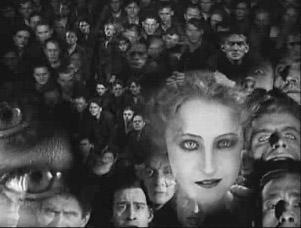
"Dear all, I was just about to put this link into a message, when Tom beat me to it.
Paula Felix-Didiér of the Museo del Cine in Buenos Aires indeed came to Berlin last week to show us what she found, and it is the real thing, no hoax this time. The material is terribly banged up, being a 16mm dupe negative made from a no longer extant nitrate print, which was duplicated some decades ago after many years of heavy use. Nevertheless one can now see the director's cut of Metropolis, 80 years after we all believed the original version was destroyed. Contrary to our thinking, obviously at least one print of the original cut made it into distribution, albeit in Argentina.
Only one of the missing scenes (the monk in the cathedral) remains missing, because it happened to be at a reel end that got badly torn. The rest is there.
The images you will find at the links Tom gave will show you some scenes, and also expose the amount of damage. They look indeed a little worse than the real thing, as they are frame grabs from a DVD transfer of the dupe.
About 10 pages of information and frame enlargements from many more missing sequences are in the printed edition of DIE ZEIT, which is coming out today. I guess you can find this at the newsstands in most countries in Europe, don't know about the international edition overseas. Flip through it before you buy it, the articles about Metropolis are in the somewhat glossy "Zeit Magazin Leben" which comes with the paper. It will surely become a collector's item.
Kudos to Paula Felix-Didiér and her initiative to unearth the material and share the information.
A lot of thinking is now necessary to find ways to incorporate this material into the existing restoration, released on DVD by Transit Film and Kino International, among others. It has titles and black leader where the missing parts once were so in principle one could just insert whatever is new at those inserts. The good news is that Friedrich-Wilhelm-Murnau-Stiftung (note: the German company that owns Metropolis and did the 2001 restoration) intends to do just that once access to the material has been granted.
The critical edition of Metropolis on DVD, which Enno Patalas derived from the 2001 restoration in order to create a "full" version of Metropolis has even more information about the missing scenes, and has the option to fill the missing scenes with not only black leader, but information from the script and other sources. When ran in synch with the material found in Buenos Aires, it is amazing to see how everything falls into place now.
The critical edition can be found here.
Martin Koerber
Leiter der Abteilung Film - Curator Film
Deutsche Kinemathek - Museum für Film und Fernsehen
Berlin
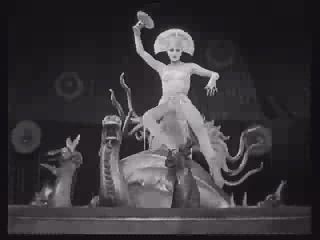
So this discovery doesn't make the 2001 research-restoration obsolete; according to Koerber and Patalas, the new material will practically drop right in. Images from the new scenes are viewable in DIE ZEIT and a few clips can be found in a German TV news story. This YouTube snippet shows us that the recovered scenes won't look pretty, but they'll give us the full vision of the film. Most of us watching classic film on 16mm and 8mm in the 1960s saw prints of movies like The Bicycle Thief looking almost this bad. Frankly, quality won't matter when compared to the thrill of seeing Metropolis in its entirety.
What will be new in the full-length Metropolis? The original 3-hour film included a couple of sidebar storylines that fleshed out characters seen only tangentially in the shorter cuts. Josaphat (Theodor Loos), the assistant fired by Fredersen, helps young Freder (Gustav Frölich) behind the scenes, and is instrumental in saving the drowning children in the third-act flood. "Number 11811" (Erwin Biswanger) is the worker at the torture clock who changes places with Freder, but gets sidetracked to the Yoshiwara house of pleasure. One of the YouTube clips sees 11811 reading an advertising flyer for Yoshiwara. Also in the brief YouTube sampling is an image of Fredersen's sinister henchman-spy Slim, or The Thin Man. Fredersen dispatches Slim to shadow Freder and report on his activities. In the clip we can see that Slim reads The Metropolis Courier -- not The Daily Planet.
If the find is complete as they say it is, we'll see major scenes that have previously been a mystery. Freder's fever dream mixes The False Maria's cabaret dance for the playboys of Metropolis, with Freder's own vision of the Seven Deadly Sins come to life. The monk from the cathedral stands over the end of Freder's sickbed, and in Freder's hallucination transforms into Slim and back again. When Fredersen discovers that Rotwang has let loose The False Maria to bring down Metropolis, the two are supposed to engage in a fight that allows Maria to escape. The rescue of the children from the underground city is said to be much longer. Another scene shows Maria fleeing for her life (yet again!), chased by an angry mob that mistakes her for the robot vixen that told them to destroy the machines.
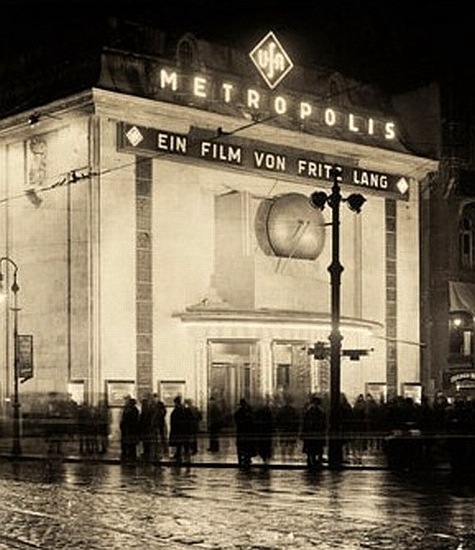
Scattered still images seen online show tantalizing new details in Fritz Lang's world of 2027. The Master of Ceremonies in the elite pleasure garden paints the lips of a playgirl, one image from what was always rumored to be a much more erotic sequence.
When asked to comment, Aitam Bar-Sagi told me that he had thought it possible that a few copies of the original Metropolis had been exported before it was radically shortened:
"Retroactively it makes some sense for it to be found in South-America, as it was in Brazil that Fritz Lang's Vier um die Frau (Four around a Woman, 1921) was found ... Although, maybe it's a coincidence!"
The Enno Palatas documentary on Kino's Restored Authorized Edition DVD reported that the full version was shown only for a few weeks (in a specially-constructed, silver-clad theater, see photo) and then never publicly shown again. Obviously everyone is delighted for that statement to be proved wrong. News this early in the discovery has every chance of being inaccurate, but it is reported that Kino will hold off on its planned Blu-ray and DVD reissue of the Restored Authorized Edition until the recovered long version can be incorporated. Think of it! The long version should also confirm the exact cutting patterns in pieces of the film that have already been reconstructed. Transferring the ragged-looking 16mm dupe to digital media also presents an interesting restoration problem: how much better can the film be made to look, and how much digital futzing is appropriate?
Frankly, I can't help thinking that it's fitting that Forrest J. Ackerman, America's number one fan of Metropolis will be able to see his dream movie intact, after eighty years. Most Metropolis lovers of a certain age learned to worship the movie in the pages of Famous Monsters magazine, and "Forry" kept a special corner of his Ackermansion museum devoted to mementos of the film.
Glenn Erickson
July 5, 2008
Republished by arrangement with film.com
Other Savant articles on
Metropolis :
Sorting out the Pulp: Cousin Films Made Half a Century Apart 7/26/99
Theatrical review of the digital restoration 10/10/01
Review, restored authorized edition 4/21/02
DVD Savant Text © Copyright 2008 Glenn Erickson
Go BACK to the Savant Main Page.
Reviews on the Savant main site have additional credits information and are more likely to be updated and annotated with reader input and graphics.
Return to Top of Page
|











